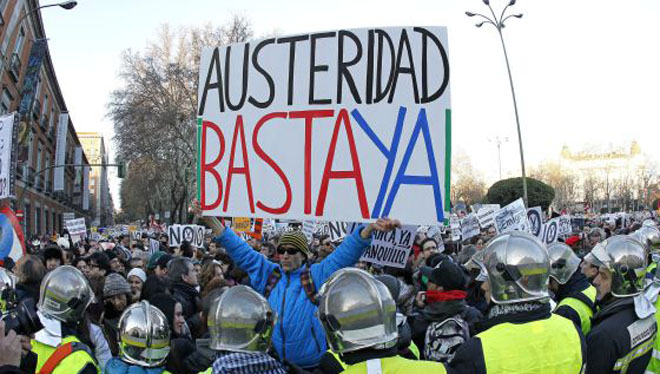Since PODEMOS started registering members on its website in July 2014, over 300,000 have joined. Tens of thousands take part in the weekly meetings of over 1000 circles scattered all over the country. With just over a year of life, Podemos has gone from nothing to becoming, according to all opinion polls, the first party of the country, polling at 30% with about 6.5 million votes. One would have to go back to 1977, immediately after the fall of the dictatorship, to find a comparable political phenomenon in terms of enthusiasm, hopes and mass organisation.
The old parties upon which the system has relied are sinking amidst generalised disgust. The PSOE (socialdemocracy) and PP (right wing) now represent, taken together, less than 50% of the total votes, an unprecedented fall.
Thus, anger against this system of exploitation, abuse and social injustice, has been transformed into political activity, into conscious struggle to transform society. This has not come like a bolt from a blue sky. The enormous wave of social struggle of the previous 4 years broke the confidence of millions of people in this rotten system and steeled their determination. But social struggle, in itself, has proven insufficient to change the current state of affairs. The profound economic crisis of the capitalist system leaves little room to stop attacks or even defend acquired gains. The idea that we need to take political and economic power into our own hands to “kick them all out” is gaining ground.
Social and economic context
The attacks the working class and other layers have suffered have no precedent in decades. It was not just drastic cuts in social spending in education, health care, culture, social services at a council and regional level, but also an onslaught on labour, social and democratic rights. The latest attack has been the so-called “Gag Law” which, amongst other reactionary measures, outlaws taking pictures of or filming the police at demonstrations and social protests.
All of this is in stark contrast with the ostentatious lifestyle of the rich. The one hundred wealthiest people in the country have seen their wealth increase by 9.4% in just one year, and now amass €164bn, equal to 15.6% of the country’s GDP, according to Forbes magazine. And this is only taking into account the publicly declared assets. The most obscene fact, revealed by Oxfam, is that the 20 richest people in Spain have the same income as that of the 14 million poorest Spaniards. It is therefore not by chance that Spain has become the second most unequal country in Europe, only beaten by Lithuania, and the country with the second highest level of child poverty.
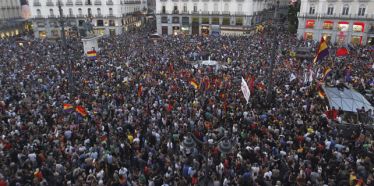 In the best of cases, the Spanish bosses organisation CEOE is forecasting unemployment to be at 20% of the workforce by 2018-19. New jobs are paying wages between 20% and 40% lower than a year ago, and thus 34% of all workers are earning less than the €645 minimum wage, because of the wide range of part time and short term contracts. Since 2008, workers’ purchasing power has gone down by 17%.
In the best of cases, the Spanish bosses organisation CEOE is forecasting unemployment to be at 20% of the workforce by 2018-19. New jobs are paying wages between 20% and 40% lower than a year ago, and thus 34% of all workers are earning less than the €645 minimum wage, because of the wide range of part time and short term contracts. Since 2008, workers’ purchasing power has gone down by 17%.
Without vigorous international economic growth it is impossible to have a real recovery of the Spanish economy: the internal market has sharply contracted as a result of the collapse in living standards, and there is an enormous and growing public debt, which represents close to 100% of GDP, meaning every year €35bn are used just to service it.
The latest data released for the EU economy, Spain’s main foreign market, shows it in stagnation bordering on recession. This is already having an impact on Spain’s economic growth, which is slowing down.
As significant economic growth is ruled out, this will mean further cuts and austerity. Nothing fundamental has been resolved.
The government was banking on the meager economic growth to maintain its level of support and even to increase its social base, but the situation is the opposite. Instead it has served to increase the fury against the government since the growth has failed to arrest the deterioration of living standards. In the meantime the callousness of the government’s austerity policies, their corruption scandals and the impunity of high society have all been publicly exposed. This explains how, despite having the “best” economic figures since 2008, both PP and PSOE are becoming even more discredited, and PODEMOS support continues to grow.
Panic in the ruling class
It is a source of inspiration to see how fear on our side has become enthusiasm and defiance, while arrogance and contempt on their side have become panic and worry. This was already shown by the withdrawal of the reactionary counter-reforms of the abortion and local election laws; the resignation of Justice Minister Gallardón and Healthcare Minister Ana Mato. This is also related to the sudden official campaign against corruption and the sudden arrest of a number of politicians involved in fiscal fraud and corruption scandals.
 The main mouthpiece of the Spanish ruling class, El Pais newspaper, gave an indication of the panic of the ruling class in one of its editorials (“A threat to the system”, 28/10): “Corruption demands the urgent cleansing of the institutions to prevent further damage”. What damage was El Pais worrying about? Was it poverty, unemployment, low wages, home repossessions, collapse of public services? None of that. Here is what worries them: “The systemic character of corruption give easy and demagogic ammo to those who advocate a break, not with a corrupt system, but with the constitution itself, looking for solutions even opposed to democracy”. Democracy according to El Pais is where people vote every 4 years and businessmen and big corporations decide government policies. It is precisely against this “democracy” that we fight. What El País fears is the awoken people mobilised and organised to turn society upside down.
The main mouthpiece of the Spanish ruling class, El Pais newspaper, gave an indication of the panic of the ruling class in one of its editorials (“A threat to the system”, 28/10): “Corruption demands the urgent cleansing of the institutions to prevent further damage”. What damage was El Pais worrying about? Was it poverty, unemployment, low wages, home repossessions, collapse of public services? None of that. Here is what worries them: “The systemic character of corruption give easy and demagogic ammo to those who advocate a break, not with a corrupt system, but with the constitution itself, looking for solutions even opposed to democracy”. Democracy according to El Pais is where people vote every 4 years and businessmen and big corporations decide government policies. It is precisely against this “democracy” that we fight. What El País fears is the awoken people mobilised and organised to turn society upside down.
Now, when the first breeze of revolution is starting to blow, the Spanish ruling class has no workers’ leaders at their disposal with enough authority to derail the aspirations of millions for radical change in society.
The leaders of PSOE, those of the main trade unions CCOO and UGT, lack any authority. Corruption scandals taint them from every corner and have revealed how the political and trade union leaders of the left and the workers movement, have become completely integrated, corrupted and eaten up by the system.
Elements of a pre-revolutionary situation
The brutal attack against peoples’ living conditions, and those of the working class particularly, as a result of the acute crisis of Spanish capitalism, has led to severe dislocation of every day life for millions of people. It has exposed the rottenness of the regime to such an extent that is has led to a serious crisis of the bourgeois regime as a whole.
We can clearly see the classic elements of a developing pre-revolutionary situation. Its main features are: crisis, splits and panic in the ruling class; discrediting of the parties and institutions on which it bases its domination by events outside of their control, where the agenda is dominated by the struggle in the streets; a shift to the left in society affecting not only the working class but also sections of the middle class which are looking for a political alternative to transform society; a qualitative leap in the political participation of the masses, not only in unprecedented mass street protests and votes to express their anger; but also in becoming politically active and joining organisations.
If we accept Leon Trotsky’s classic definition of what a revolution is: “forcible entrance of the masses into the realm of rulership over their own destiny”, there is no doubt that Spain is on the verge of a revolutionary process.
A turning point
 The turning point which marked the beginning of this period was the European elections on May 25, 2014. The two main parties, PP and PSOE, were shown to be thoroughly discredited getting a joint vote of only 49%. To this we have to add the highest ever vote for parties to the left of social democracy, with United Left (IU) and Podemos getting a joint vote of 18%, nearly 3 million votes. The most significant fact was the emergence of Podemos from nothing to getting 1.25 million votes, 8% of the electorate. A few weeks later Podemos left IU behind in the opinion polls and started to threaten the traditional domination of PP and PSOE.
The turning point which marked the beginning of this period was the European elections on May 25, 2014. The two main parties, PP and PSOE, were shown to be thoroughly discredited getting a joint vote of only 49%. To this we have to add the highest ever vote for parties to the left of social democracy, with United Left (IU) and Podemos getting a joint vote of 18%, nearly 3 million votes. The most significant fact was the emergence of Podemos from nothing to getting 1.25 million votes, 8% of the electorate. A few weeks later Podemos left IU behind in the opinion polls and started to threaten the traditional domination of PP and PSOE.
The result of the May 25 election and the events it opened subsequently, are the first significant political expression of the mass mobilisations in Spain in the past four years. The figures for 2014 have not yet been published, but in 2012 and 2013 there was an average of 123 protest actions every day, of varying size and scope. 25% of the population say they have taken part in demonstrations. Without all this accumulated experience the emergence of Podemos would not have been possible.
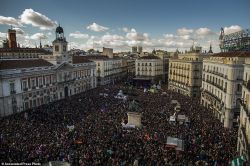 Just to mention some of the most important mass movements of that period: the movement of the Indignados in 2011-12; the campaigns against cuts with the emergence of the so-called “tides” (mareas) against cuts in healthcare, education, culture, etc; the two massive one day general strikes in 2012; the miners’ black march on Madrid at the end of June 2012; the struggle against evictions and home repossessions; the struggles against police and judicial repression; the wave of all out strikes in Autumn 2013 to Spring 2014 against factory closures, wage cuts and attacks on working conditions; the peoples’ uprising in the Gamonal neighbourhood in Burgos in January 2014; the Dignity March on March 22 which brought a million people to Madrid; the mass mobilisations in Catalonia for national democratic rights; the setting up of a network of rank-and-file organisations (“Tides”, anti-evictions campaign PAH, platforms against repression, Peoples Solidarity Network, etc) which are not under the direct control of any political organisation and gather tens of thousands of activists.
Just to mention some of the most important mass movements of that period: the movement of the Indignados in 2011-12; the campaigns against cuts with the emergence of the so-called “tides” (mareas) against cuts in healthcare, education, culture, etc; the two massive one day general strikes in 2012; the miners’ black march on Madrid at the end of June 2012; the struggle against evictions and home repossessions; the struggles against police and judicial repression; the wave of all out strikes in Autumn 2013 to Spring 2014 against factory closures, wage cuts and attacks on working conditions; the peoples’ uprising in the Gamonal neighbourhood in Burgos in January 2014; the Dignity March on March 22 which brought a million people to Madrid; the mass mobilisations in Catalonia for national democratic rights; the setting up of a network of rank-and-file organisations (“Tides”, anti-evictions campaign PAH, platforms against repression, Peoples Solidarity Network, etc) which are not under the direct control of any political organisation and gather tens of thousands of activists.
All of this already marked a turning point for several million people who had broken with the regime. It was also an indication that a growing layer of workers and youth were looking for a political alternative for social transformation.
Starting on May 25 there were a series of events which for the first time since the beginning of the crisis provoked the fear and panic of the ruling class. Thus, we saw the crisis in the leadership of PSOE, with the resignation of its general secretary Rubalcaba, and the abdication of King Juan Carlos due to corruption scandals. In the hours which followed the announcement of the abdication there were spontaneous demonstrations throughout the country involving tens of thousands of people demanding a Republic.
Another phenomena, as relevant as Podemos, has been the setting up of the Ganemos platforms (Let’s Win) for the May 2015 elections. These are in fact a united front of left parties, organisations and social movements. Such platforms started in Barcelona, under the name of Guanyem (Let’s Win in Catalan), on the initiative of Ada Colau, who had been the national spokesperson of the anti-evictions campaign PAH.
The majority of opinion polls show that such Ganemos platforms are in a position to fight for a majority in the main cities in the country, which would be a real political earthquake.
The first reaction of the ruling class and its parties to the emergence of Podemos was one of anger and fury. For months they waged a hysterical campaign of insults, criminalisation and hatred against Podemos and its leaders. They were accused of complicty with ETA, of being financed by Venezuela and Cuba, of wanting to bring a “castro-bolivarian dictatorship” to Spain, etc. But this did not have any impact in stopping the rise of Podemos, which shows how discredited the leaders and official parties of the system are.
Now we can see a change in attitude. While the ruling class and its media are still waving the stick, at the same time they have started offering the leaders of Podemos a carrot, to attempt to integrate them within the system and to divert the potentially revolutionary aspirations which are contained in their mass support.
What has happened with United Left?
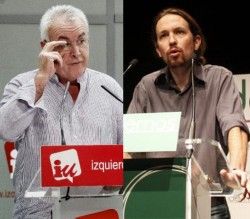 The rapid rise of Syriza to being Greece’s main opposition party were the focus of attention in Spain in 2012, where people started to look at IU (United Left). In a few weeks its standing in the polls went from the 7% it got in the November 2011 general election to 16% in the Autumn of 2012.
The rapid rise of Syriza to being Greece’s main opposition party were the focus of attention in Spain in 2012, where people started to look at IU (United Left). In a few weeks its standing in the polls went from the 7% it got in the November 2011 general election to 16% in the Autumn of 2012.
This was a key moment for IU, where it could have emerged as a force clearly opposed to the establishment, raising radical demands and awaking hope for a real change amongst millions who at that time were already in the streets participating in mass mobilisations.
However, even at that time, the leadership of IU did not break with the old ways - they strengthened their links with the establishment, ignoring the new situation. The material interests of thousands of its public officials at regional and municipal level prevailed. Thus, they reached a coalition agreement with the PSOE in Andalucia, which made them responsible for a policy of austerity; they also supported a minority government of the right wing PP in Extremadura. In Madrid they sank into a corruption scandal involving IU appointed councillors on the board of the region’s largest banking institution (Bankia), in whose defence the regional IU leaders quickly lept!
As a result, from the beginning of 2013, support for IU stopped growing in the opinion polls. The main reason, as well as the fact that it was seen as part of the system, was the fact that the leadership put a stop to its shift to the left which had started a year earlier. Above all, IU was unable to launch any radical slogans to inspire and enthuse the masses, unlike what Podemos did later.
Alberto Garzón, the young leader of IU, known for being to the left within the organisation, who has now become the organisation’s candidate for the general elections, expressed his frustration with the policy of IU in these years: “IU has had little political ambition, and the rhythm of history in society has gone faster than that of the organisation (…) The candidature I represent wants to make a self criticism, wants to say that IU is a useful tool for the transformation of society.” (Publico).
However, the “left wing” of United Left has not waged a serious and public battle to defy the national leadership.
For these reasons, the most active layer of the masses did not find in IU the alternative it was looking for and when other options appeared, which more clearly expressed their spirit, their class hatred and their rage for a real change in the country, they joined them enthusiastically. This was the case with Podemos.
What is Podemos?
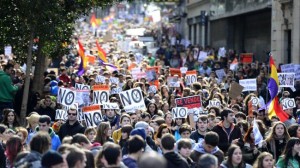 The emergence and development of Podemos raises an important theoretical debate about the way in which mass political organisations arise.
The emergence and development of Podemos raises an important theoretical debate about the way in which mass political organisations arise.
In general, when the masses enter into the political arena, they tend to do so by going first towards their traditional mass organisations. This is generally correct, but it should not be understood as a dogma which is valid for any situation and any place.
Historically, the traditional mass organisations – socialist and communist parties, trade unions, etc – always expressed the movement of the working class. They acquired certain internal life in times of social upheaval, and fell into apathy in times of economic upswing or relative social stability. But always, in one way or another, maintained certain roots and direct links with the masses, so that in moments of social polarisation and revolution, there would occur a process of internal differentiation, with the emergence of left wing currents, expressing the pressure of the working class, and right wing currents expressing the pressure of the ruling class. Eventually such divisions would lead to open splits, either of the right or the left wing. Mass splits like this from the socialist parties in the 1920s, under the impact of the Russian Revolution, gave rise to the Communist Parties.
Similar situations emerged in the 1930s and also in the 1970s, the last global revolutionary wave before the current one.
However, we are now witnessing a peculiar phenomenon in some countries which we have to explain. In the moment of the biggest social and economic turmoil in Greece’s and Spain’s recent history, the old socialist parties, which for decades had overwhelming electoral support, but whose leadership was fully involved in the policies of austerity and attacks on the working class, have given no serious expression of the movement of the class. No significant voice has been raised in opposition. There has been no socialist programme, not even a left reformist one. There has been no significant opposition current within these parties, which in the case of PASOK has completely collapsed.
What this means is that these parties, at least in Greece and Spain, have degenerated so much, have lost their links to the working class to such a degree, and been co-opted by the state apparatus so thoroughly that they have not been able to reflect within them the movements and the rage of the working masses. In the case of Greece, this is almost a finished process. In Spain, although we cannot yet be certain, PSOE could follow the same road as PASOK.
It is not by chance that the complete rottenness of social democracy should be expressed in this great historical turning point, at the beginning of the European revolution in the south of the continent.
So, what is Podemos and how did it emerge? Podemos is a reflection of the turbulent political and social situation in Spain. Paradoxically, the initiative to create it did not come from any body of the mass movement nor from its most known leading activists, but from a group of media activists and university lecturers around the figure of Pablo Iglesias (most of whom had been linked to United Left in the past). They were joined by the Anticapitalist Left organisation, activists from the Civic Front of Julio Anguita (former national spokesperson for United Left), and with the support of the online paper Público, which has a wide following amongst left wing activists. As soon as it was launched Podemos attracted a layer of social and trade union activists who had participated in a widespread network of social movements which had formed the 15M movement of the Indignados.
In fact Podemos arose and developed because of the political and ideological vacuum in the labour movement and the left, as a result of the inability of IU’s leadership to emerge as a point of reference with sufficient moral and political authority.
It has to be added that for a political initiative like Podemos to acquire the mass appeal it had, in the social and political conditions which we have described, it could not have been launched by a small nucleus of people with good intentions. If this was the case, any bold small group of people would be able to create a mass movement from nothing. Something else is needed: a loudspeaker, a soap box, a platform which puts you within sight for millions of people. As one of those historical accidents which express necessity, that platform, that loudspeaker came through exposure in the TV. In the past 18 months Pablo Iglesias has participated regularly in TV debates and politics chat shows with a wide audience. His radical ideas entered the living rooms of millions of families on a regular basis for months and connected with the mood of rage, malaise and indignation which existed. It was this newly won popularity from which the political movement was launched, precisely a year ago.
In a short space of time Podemos organised dozens of well attended public meetings throughout the country and dozens of local circles were set up organising several thousand people. As a result of its success in the May 25 European Elections in 2014, the movement underwent explosive growth.
Podemos and the national question
One of the most positive effects of the rise of Podemos and Guanyem in Barcelona has been to cut across the dangerous process of division of the Catalan and Basque workers from their class brothers and sisters in the rest of Spain. The bold and courageous defence by Podemos leaders of the right of self-determination, for the first time, has shown to the people in Catalonia and the Basque country that in the rest of Spain there is a force which supports and respects their democratic rights. This has undermined the splits and divisions within the working class promoted by the Spanish right wing as well as by the Catalan and Basque bourgeois nationalists. The fact that Guanyem in Barcelona involves some who advocate independence for Catalonia as well as some who wish to remain within the Spanish state also undermines the attempt of Catalan bourgeois and petty bourgeois nationalists to erect a barrier dividing the working class in Catalonia along national lines.
Opinion polls show that Podemos is becoming a significant force in Catalonia and the Basque country, to the point of overtaking the PSOE as the main force in the non-nationalist left. In Catalonia Podemos would be the first party in a general election (though not in a Catalan parliament one). In the Basque Country, Podemos would be the second largest force in the Basque Autonomous Community with over 25% of the votes, being the first party in Araba, joint first with EH Bildu in Guipuzkoa, as well as being the first party in Navarra (which is a separate Autonomous Community).
The Citizens’ Assembly and internal debate in Podemos
In the months of October and November 2014, Podemos held its founding congress, the Citizens’ Assembly. The most important part of this process was the national meeting on October 18-19 in Madrid. It was an extraordinary meeting, with 8,000 enthusiastic participants: young, veteran fighters from the 1970s, workers, the unemployed, housewives, pensioners. Resolutions in defence of the national health service and state education were passed, as well as others against home repossessions, corruption, and one on the national debt.
There was a lively debate with speakers arguing for genuine democracy, in society and within the organisation, against the banks and capitalism, for the nationalisation of the strategic sectors of the economy. References to the working class were received with a standing ovation, which refutes the idea that Podemos members have no ideology.
However, Podemos does not have a socialist programme, based on the expropriation of big business under workers control, which would be the only way to put into practice the reforms contained in its programme.
Podemos should also give itself an internal structure which can guarantee the most thorough control of the leadership by the rank and file members. No one can deny the democratic character of the congress period, but it is worth analysing the organisational method which was used in the Citizens’ Assembly to see whether it is the best for encouraging the widest and most conscious participation of the membership. From our point of view, the system chosen has some deficiencies which could be improved upon with a different method.
For instance, there was no process of local, provincial and regional assemblies prior to the Citizens’ Assembly, with elected delegates. Unfortunately this is the result of the Podemos leadership echoing and promiting the prejudices of those layers which have only recently started to participate in politics. They are against the idea of assemblies of elected delegates as the best, most efficient and most democratic way of debating and taking decisions within mass organisations.
As a result, members had to face the task of reading and debating, at only the national level, all of the documents and amendments - whether they represented the views of a large section of the organisation or just one person with a limited backing. Furthermore, this whole process was done online, without any face to face debate at local meetings with people arguing for and against the different positions. This meant that in the end it was only a minority of members, those with enough time, who could really participate in the debates and decision making process.
This was made worse because the debate system allowed any member to move amendments or alternative documents, with only one condition of getting backing from 4 other members, who were not even required to actually agree with the position. This meant that the proposal from a circle which had been debated and agreed by 30 or 50 people in that circle was worth as much as the position of one single individual member.
In the end there were hundreds of amendments and alternative documents, making the internal debate process extremely cumbersome and difficult to manage. In order to put some order into this an anonymous Technical Team was appointed by the provisional leadership, which was not subject to any democratic control, with the task of pushing similar documents and amendments to composite. Even so, finally the members were faced with the impossible task of, within a week, making a decision in favour of three documents (political, organisation and ethic principles) from amongst a mass of 55 drafts (23 for the political document, 22 for organisation and 10 for the ethics principles). This worked out at 8 documents a day for a whole week.
The system chosen for voting the different documents was also problematic as one had to vote en block for the documents presented by the same group of people for the different areas (politics, organisation and ethics), rather than allowing members to choose in each category the document they considered the best. This gave an advantage to the leadership team around Pablo Iglesias which forced the block vote of its 3 documents, and furthermore, Pablo Iglesias had linked his continuation as a leader of the organisation to the approval of his set of documents.
When it came to voting the candidates for General Secretary, the Citizens’ Council – the highest body in the organisation made up of 62 people – and the Control Commission – made up of 10 people – the procedure was similar. There were 30 full slates and hundreds of individual candidates: 72 for General Secretary (10 as part of a slate, 62 indivually); 693 candidates for the Citizens Council (233 as part of 21 slates and 460 individually) and 268 candidate for the Control Commission (93 as part of 13 slates and 175 individually). Thus, Podemos members had to choose and vote, online, for their preferences, having only a week to choose from amongst this huge number of candidates (1173), most of whom were completely unkown. As it is known, the slate proposed by Pablo Iglesias also received overwhelming support in this leadership election.
We think that it would have been better and more democratic, to have a system of delegates elected at the local circles, which would have greatly simplified the system of debate and would have given to the membership 3 or 4 documents and slates which represented the main political viewpoints. Having said that, our movement is still young and we trust that experience will create the conditions to overcome these weaknesses, both political and organisational.
The need for ideological clarification
The main spokespersons of Podemos have from the very beginning paid tribute to the marverlous revolutionary movements which have taken place in Latin American in the last decade. Experiences like Venezuela’s Bolivarian Revolution, Ecuador’s “Citizens’ Revolution”, and similar processes in Bolivia and Argentina, have had an important impact in shaping their political and organisational ideas.
From those they have borrowed the name of Circles for Podemos’ branches as well as the idea of “the people vs the oligarchy” in which the working class is dissolved within the “oppressed nation” alongside small owners and businessmen, who are facing an oligarchy backed by imperialism.
On the other hand they have explained that they refuse to describe their movement as left wing – although they describe themselves as such at an individual level – arguing that the “left-right” dichotomy is no longer useful in uniting the majority of the population, as the term “left wing” can alienate potential supporters from a right wing background. Instead of this, they talk of “peoples’ unity”.
From our point of view, many of the organisational and political conclusions reached by these comrades are the result of mechanically applying Latin American ideologies and organisational forms which – while having roots in the history and struggle in that continent – are not adequate to the real situation in Europe and in Spain in particular.
To start with, the majority of Latin American countries have a class composition which is more complex than that of Spain. They are, in general, more backward from the point of view of capitalist economic development, in many cases forced to be mere exporters of raw materials within the international division of labour dominated by imperialism. In most of these countries the main class division in society, between workers and capitalists, has not developed in such a complete way, and is combined with social and economic forms which mix capitalist and colonial elements. To this we must add the massive exodus from the countryside to the cities creating a large pool of urban poor, living in the outskirts of the big cities, unemployed or underemployed.
This is the reason why Latin American “left wing” nationalism has a material base on which to develop and still plays a relatively progressive role in the struggle against capitalism and imperialism. Thus, the nationalism of a Venezuelan or Mexican worker or peasant plays a useful role in their mobilisation against the looting and plunder of their countries by foreign multinationals and their local elite allies.
However, Spain is an imperialist country, even though a second rate one. The working class represents close to 80% of the active population, while the peasantry and urban petty bourgeois only a small minority of the population. Spain has no significant reserves of raw materials nor natural resources exposed to looting by foreign multinationals. Here class consciousness is highly developed amongst workers and it is not mediated by feelings of imperialist exploitation, but by exploitation by “our own” home-grown capitalists and bankers.
In reality, Spanish nationalism feeds on the old and decadent imperial past of the 16th to 19th Centuries, and the exploitation and looting which Spanish multinationals are subjecting Latin American and north African countries to today. It has a reactionary tradition which is also used to deny national-democratic rights to the Catalan, Basque and Galician peoples, such as the right of self-determination. Neither the working class nor other excluded peoples’ layers have ever been mobilised for social justice, in our contemporary history, under the banner of Spanish nationalism. The opposite has been the case.
To tell the whole truth, the Latin American “left wing” or “peoples’” nationalism has also shown important limitations. Despite everything, in these countries, the working class is the only class which can lead the oppressed nation against capitalism and imperialism, as was the case in Russia in 1917, which was also a backward country oppressed by imperialism. In Venezuela, Ecuador, Bolivia or Argentina, “peoples’” nationalism will not be able to shake the yoke of foreign and national capital without expropriating them under workers’ control.
We also disagree with the idea that characterising the movement as “left-wing” would be an obstacle in order to win the support of a significant majority of the population. People are not guided by labels in their political preferences, but rather by the concrete content of an organisation’s program and policies.
The main appeal of Podemos has not been that it does not define itself as “left wing”. On the contrary. It has been the fact that it has appeared as being staunchly against the establishment, its leaders’ speeches against the bankers, the rich and the “caste” (the establishment), in favour of social spending and taxing big business; all of which are ideas which the majority of the people identify as those of a left wing organisation. The phrase “left-wing” is identified with the struggle for social justice and against all kinds of oppression and discrimination. As a matter of fact, opinion polls show that both Podemos voters and the population at large identify Podemos as being in the far left of the political spectrum (2.4 on a scale of 1 to 10, where 1 is extreme left and 10 is extreme right), even a bit further to the left than United Left (2.6 on the same scale). Thus, despite (or in reality thanks to) Podemos being identified clearly as a left wing organisation, its support is growing in the opinion polls.
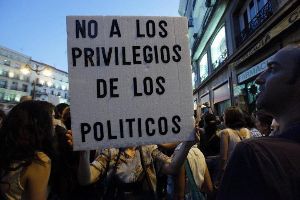 The fundamental base of support for Podemos comes from the workers, as shown by all serious sociological studies published, including those of the government’s Centre for Sociological Studies. The significant levels of support which Podemos additionally gets from middle class layers is a reflection of the profound shift to the left amongst these layers, as has happened many times in history, attracted not by Podemos’ alleged “moderation” but rather by its radical image, the idea that it wants to change the current unbearable situation from the root.
The fundamental base of support for Podemos comes from the workers, as shown by all serious sociological studies published, including those of the government’s Centre for Sociological Studies. The significant levels of support which Podemos additionally gets from middle class layers is a reflection of the profound shift to the left amongst these layers, as has happened many times in history, attracted not by Podemos’ alleged “moderation” but rather by its radical image, the idea that it wants to change the current unbearable situation from the root.
For us the use of the word “left wing” has nothing to do with the defence of an abstract “label” but is linked to a serious, scientific analysis of the structure of society, its problems and the way to overcome them.
For us, the social and economic problems we are facing are the inevitable product of a class divided society, and not the result of the actions of “bad” politicians or businessmen, which, if replaced by “good” politicians and businessmen, would be resolvable. The most virtuous and progressive businessman will be left with no option but to increase the exploitation of its workers if competition from a rival businessman threatens to bankrupt him. And he will attempt to evade taxes as much as possible in order to increase profits, as this, and no other, is the aim of a private company. If he is able to bribe politicians and judges in order to maintain his company’s profitability and expand his markets he will not hesitate. This is not a moral problem but rather of his interest as part of a social class which lives off the exploitation of the labour of others in order to make profits. And profits come – as Marx explained over 150 years ago – from the unpaid labour of the workers, from the exploitation of labour.
How is this related to “left wing”? The political content of the definition “left wing” has evolved since its origins in the 19th Century until it became synonymous with a class-based understanding of society, or if you prefer, one which is based on the interests of “those from below” against “those from above”. To remove the phrase “left wing” from our political vocabulary implies removing the concept of class struggle. For this reason we disagree with some of the leading comrades in Podemos. In any case, we must have a sense of proportion. For us this is a rather secondary aspect in the debate within Podemos as in fact it has never had much impact amongst its ranks nor amongst its supporters and voters, the majority of which consider themselves and regard Podemos as left wing.
There are other aspects which we would like to mention. Some comrades in Podemos argue in favour of abandoning the “outmoded” language of Marxism (“class struggle”, “socialism”, “revolution”) as they consider it an obstacle to winning the support of wide layers in society which would view it as “too radical”. In the same way they try to avoid taking a clear stance on important debates like that of Republic vs Monarchy, the nationalisation of big businesses, etc. They argue that to use such language or to enter into such debates would give ammunition to the bourgeois media pundits who would use it to make a big fuss and thus alienate sections of the middle class and backward workers from Podemos. They are in favour of using a different, “less confrontational” language, like “people”, “citizens”, “country”, “de-privatisation”, which in their view would help attract those layers.
It is true that Pablo Iglesias has declared that they try to “sweeten” their words and the expressions they use, but that in the end what they are saying is the same. For instance he said that the word “de-privatisation” sounds better than “nationalisation” and makes it more difficult for the reactionary press to criticise it.
In answer to this we have to say two things. First, it is not the first time that such arguments have been raised within the left. Traditionally, the social democrats say that language and program should be “softened” and moderated in order to attract the middle layers in society. Unfortunately, what began as a concession in language to backward political prejudices, finally ended up in political concessions to big business and assimilation into the system they claimed to be fighting against.
Secondly, it is not possible to approach the task of transforming society by playing hide-and-seek with the ruling class, or wanting to be more cunning than them in the use of communication tools. The ruling class will not be fooled. But we can end up introducing confusion amongst those who suffer the injustices of the system and clouding the real aims we are fighting for. The working class and the youth deserve to be told clearly and loudly what we want and what is needed to transform society, starting with the most advanced layers who are actively participating in Podemos circles and social movements, demonstrations, strikes, etc.
Only if the majority of the population who suffer under this system have a clear understanding of the cause of their problems and how to solve them, will they be willing to give everything to transform reality around them.
Marxists are not “radical” per se. In reality we are the most realist, as we have an understanding of the laws that rule society. This allows us to see society as it is and gives as the key and the programme needed to change it.
We accept that convincing a clear majority of our proposals might take longer than with other proposals which apparently offer an “easier” and “less painful” alternative, even though in practice it leads to a dead end. But we are convinced that experience and our agitation will end up winning over the majority of the working class and other oppressed layers to the idea of the socialist transformation of society. Furthermore, the revolutionary period we have entered into is characterised by the rapidty with which wide layers of the masses draw the most advanced conclusions. Consciousness is changing fast.
The programme of Podemos
As we said at the beginning, the Spanish and European ruling classes are in an hysterical panic, trying to scare the population away with the looming threat of an economic disaster if Podemos were to come to power and implement its programme.
But what does that programme actually say? Although there is not yet a finished programme, there is a “basic guidelines document” for discussion, and other proposals have been made in several interviews. In general what is being proposed is that the rich should pay higher taxes and tax evasion should be fought against; the repeal of the PP reactionary labour “reform”; to bring the retirement age back to 65; to lower the price of electricity; to increase health care and education spending; the shortening of the working week without a loss of pay so that more of the unemployed can work; that corrupt politicians and businessmen should be punished with jail sentences and their stolen assets seized; amongtst other proposals.
These are all progressive measures which we wholeheartedly support and which will go some way in alleviating the suffering of millions.
It is a joke in bad taste when the bourgeois media scaremonger about an economic crisis caused by a future Podemos government, for we have suffered this for half a decade now.
There are 5.5 million workers who are unemployed, 750,000 families with no source of income, 300,000 families whose homes have been repossessed. There are 300,000 youth who have been forced to emigrate, new contracts pay only €600 a month and are overwhelmingly casual and short term, sometimes for just days or weeks. Is that not already an economic disaster?
Tens of thousands of overtime hours left unpaid; pensions and wages frozen; hospitals, schools and universities without resources. All of this is already a disaster. This is “our” disaster, the one we and our families are suffering.
Are the rich and powerful facing a disaster? Have they perhaps given up their millionaire bonuses so that they can make the same sacrifices which are asked from working class families? Not at all. Corporate profits are up by 64% according to Spain’s central bank. The banking sector expected profits of €10bn in 2015, the highest since 2010.
The programme proposed for discussion by the leaders of Podemos, even with its limitations, can only be implemented if the rich and big businessmen are forced to give up part of their massive profits in order to solve the most pressing social needs. This is “their” panic and the “disaster” they are talking about.
May municipal and regional elections
It is difficult to draw a precise electoral perspective. We are in a period of sudden and sharp changes in society and political affiliations. Four or five months are a long time and many unexpected events can take place with a decisive impact in an already explosive social environment. Therefore any electoral perspective must be conditional and subject to review. However, it seems clear that there are three parties, PP, PSOE and Podemos, fighting for first place and getting 22-30% of the vote each. We can also say that whatever political changes take place, the left will win an overall majority in both the May regional and local elections and the general election in November (if we include here the PSOE since its voters are mainly from the left). On the other hand the PP will suffer a severe defeat, with its local, regional and national power bases built up over 10 years crumbling.
It is to be expected that Podemos will join other forces in the Ganemos lists for the municipal elections in many cities. In others the local IU leaders have prevented this from happening through bureaucratic manoeuvres. In some others sectarianism of opportunist elements within Podemos has prevented unity.
It is likely that Ganemos will overtake the PSOE in most big cities, particularly in Madrid, Barcelona, Valencia, Seville, Zaragoza or Vigo.
This will open up a very interesting situation. Although it is likely that Ganemos will be the first political force in many of these cities, it might not have the necessary overall majority to rule on its own, with the PP retaining part of their electorate. That would put the PSOE in a difficult position of having to choose between supporting Ganemos against the right or allowing the PP to rule.
A similar situation might emerge in the regional elections, where all opinion polls point to a left wing majority in the Madrid region, Valencia, Asturias, Aragon, Extremadura, Murcia and others, where Podemos could emerge as the first or second political force.
The PSOE leaders would be put to the test. For months they have joined the chorus of the right against the “populism” of Podemos. Would they support Podemos or will they lean towards supporting the PP, anticipating a “national unity” government after the Autumn election?
If they were to support Podemos or Ganemos, the chorus of indignation from the capitalist press would be deafening and could even lead to splits within the PSOE with the more openly bourgeois elements leaving the party. On the other hand if the socialist leaders decide to join the PP and other right wing organisations in order to stop the left from coming to power in key cities and regions, they would pay dearly with their support collapsing in the November general election. This would open up a PASOK scenario for PSOE. Many local branches and even mid-layer leaders of PSOE would refuse a national leadership decision to support the PP, plunging the party into crisis.
The ruling class is clearly worried, fearing that after the general election they will not be able to form a government of their own - not even by combining the MPs of PSOE and PP. This is a serious risk for the ruling class.
What seems inevitable is a good result for Podemos and Ganemos in local councils and regional governments, which would further increase support for Podemos in the November elections, where it will most likely be the first political force, though not reaching an overall majority.
Perspectives for a Podemos government
The perspective of a “national unity” government is being advanced (though sotto voce) by prominent members of both PSOE and PP. However this is always the last card for the ruling class and they will be careful not to use it too early if they can avoid it. There could be a PSOE or PP minority government with outside support from other parties after a November election. The capitalist paper El Pais is actually advocating an early election to prevent the parties of the regime from being further discredited.
If a minority government is formed, it is likely to be weak and unstable, not lasting for very long. That would then open the way for a grand coalition involving PP, PSOE and possibly the right wing populists UpyD and Ciudadanos, with support from the Basque and Catalan bourgeois nationalists.
Such a national unity government would immediately be extremely unpopular. Its policies would be a continuation of the discredited austerity measures. It is unlikely that such a government could complete its term in office. Under the hammer blows of social protests, repression, economic stagnation, corruption scandals and so on, an unbearable situation would develop which could lead to early elections being called.
In such a situation it is almost inevitable that a left-wing government of Podemos would be formed, perhaps in a coalition with other forces like IU.
The coming to power of a Podemos government, on its own or as a coalition with other left forces, would unleash an enormous wave of enthusiasm. Such a government would face the opposing pressures of the ruling class and the workers.
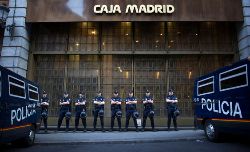 From the first day there would be threats by the ruling class, flight of capital, factory closures, economic sabotage, trying to put the government against the ropes. At the same time all the democratic demands of the masses, like the right of self-determination for Catalonia and the Basque country, a referendum on the monarchy and the complete separation of the Church and the state would also come to the fore.
From the first day there would be threats by the ruling class, flight of capital, factory closures, economic sabotage, trying to put the government against the ropes. At the same time all the democratic demands of the masses, like the right of self-determination for Catalonia and the Basque country, a referendum on the monarchy and the complete separation of the Church and the state would also come to the fore.
Podemos will be faced with a choice: either to advance towards a socialist policy of expropriating the ruling class, or retreating under the pressure of Capital, betraying its mandate.
The need for a Marxist current – Podemos for Socialism
We think it is absolutely vital for the movement to have political and ideological clarity about the tasks posed by history. There is an urgent need for a Marxist network or current within Podemos: a Marxist current with the aim, not of joining the jostling for positions, but rather of contributing the necessary tools and the most useful proposals in order to fight against exploitation and social injustice. The comrades of Lucha de Clases (Class Struggle), together with dozens of others in Podemos, have set up Podemos for Socialism, as a discussion circle with this aim. Join us!
Originally published in Spanish in America Socialista

